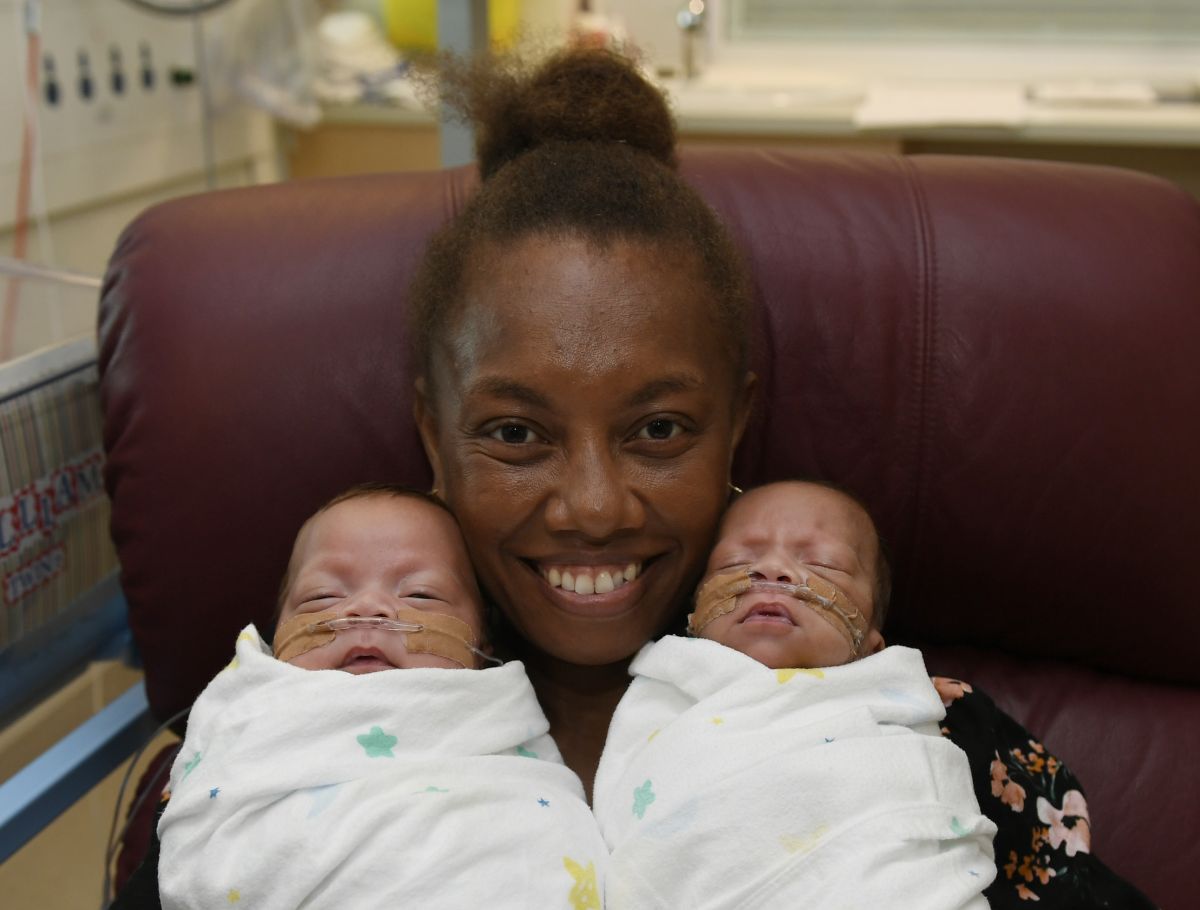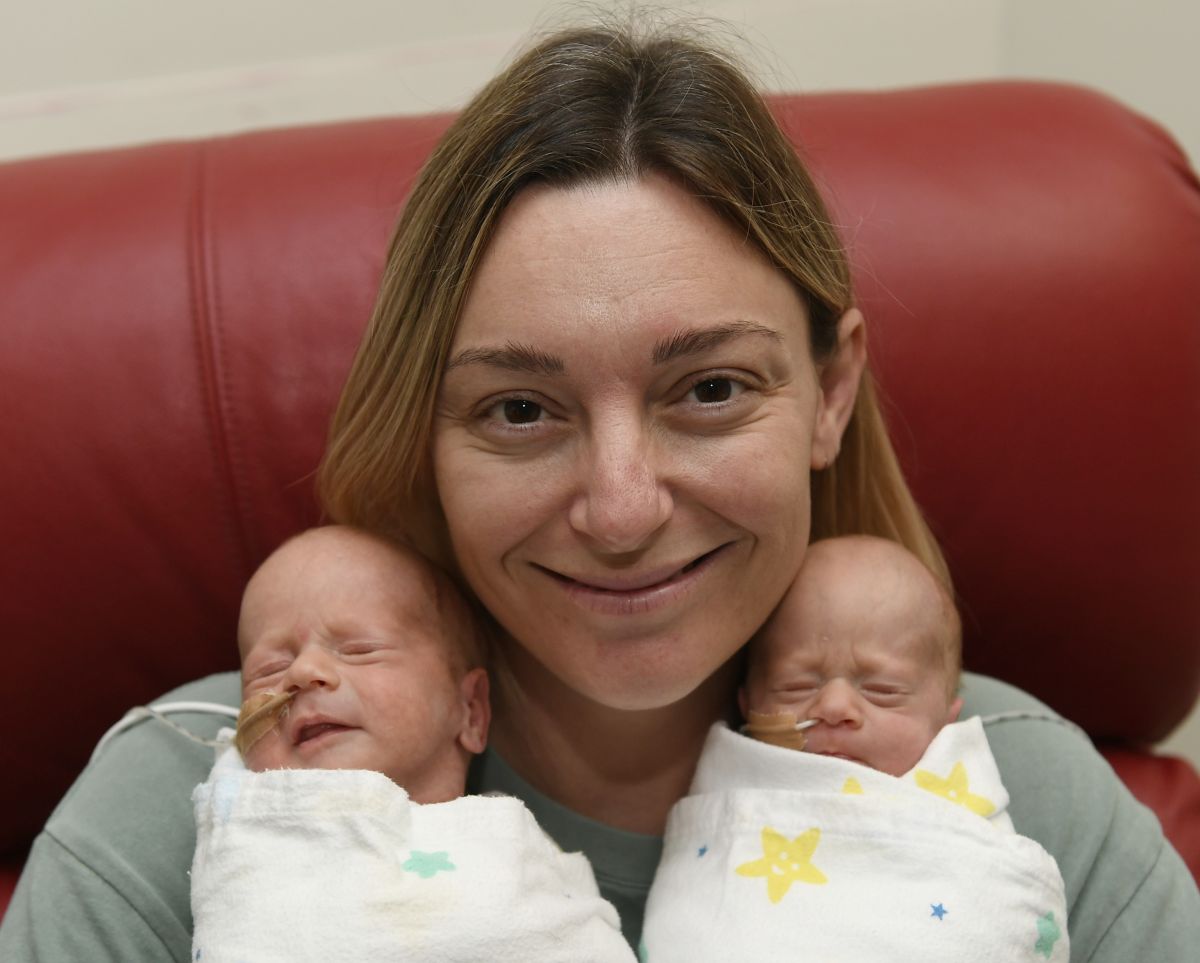Double delights this Multiple Birth Awareness Week
Published: 24 March 2023

Townsville University Hospital neonatal staff are seeing double this Multiple Birth Awareness Week with two sets of identical twin boys winning hearts.
Both sets of twins, Alexander and William Marller and Evan and Owen Grice, each came from a single egg that split in the early days of pregnancy.
For Jessica Marller and Louise Grice their baby boys are nothing short of tiny miracles, with both mums grateful for the care of the neonatal and maternal fetal medicine (MFM) teams.
MFM specialist Dr Cecelia O’Brien said around 30 per cent of twins were identical.
“Monochorionic (identical) twins occur in around one in 300 pregnancies and these babies share a placenta,” she said.
Jessica and husband Cameron Marller’s boys were born 18 December last year at 26 weeks, with Alexander weighing in at 850 grams and William at 972 grams.

Image: William (left) and Alexander Marller with mum Jessica.
“I was surprised in an unsurprised way when I originally found out it was twins,” Mrs Marller said.
“My grandmother had twin siblings and my brother and sister would tease me that I would be the one to have twins.
“When the sonographer was taking her time during my first ultrasound and then asked if we had any multiples in the family, we knew.
“My husband was a bit gobsmacked, and we walked around in a daze for a few days.”
Alexander and William are monochorionic diamniotic twins which means they shared a single placenta but had separate amniotic sacs.
Mrs Marller said the twins were a ‘blessing’ and had taught her about balance and sharing her time.
For Cannonvale couple Louise and Mathew Grice, the news that Louise was expecting twins was equally unexpected.
“There are no twins in the family, so it was very much a shock for us,” she said.

Image: Twins Evan (right) and Owen Grice with mum Louise.
“I told Mathew he didn’t need to be at the scan as we had already gone down this road with our first son, Cameron,” she said.
“I couldn’t believe it when they told me and waited until Mathew got home from work before I said anything,” she said.
“I’d taken a photo of the scan to show him.
“His jaw dropped, and his face screwed up, but I could see he was smiling.”
Evan and Owen were born early at 32 weeks and five days weighing 1.3kg and 1.7kg respectively, after Louise was diagnosed with twin-to-twin transfusion syndrome.
Dr O’Brien said twin-to-twin transfusion syndrome occurred when the babies shared unequal amounts of the placenta’s blood restricting the growth of one baby.
“The blood vessels from one baby join up with the other baby’s blood vessels, which leads to one baby receiving more blood and the other baby getting less blood,” she said.
“We transferred Louise to Brisbane when she was 18 weeks pregnant where she underwent a procedure called fetoscopic laser surgery which separates the blood vessels that run from one twin to the other.
“One of the complications of all twin pregnancies is that women, particularly after these types of procedures, can rupture their membranes and go into preterm labour, which is what happened with Louise, but she was able to get to 30 weeks which was wonderful.”
Mrs Grice’s membranes ruptured on February 9, and she was immediately transferred from Proserpine to Townsville where she spent a week in hospital.
The family then moved to motel accommodation and the waiting game began.
Mrs Grice went into labour on 24 February with Mathew rushing her and a sleeping Cameron to TUH at around 11.30pm.
Evan was born at 11.56pm on 24 February and Owen at 12.02am on 25 February meaning the twins have separate birthdays.
Mrs Grice said being the mum of multiples was ‘surreal’.

Image: Twins Evan (left) and Owen Grice.
“The first time they were both put on me, it felt like a bit of a glitch in the matrix to look at both of them at the same time,” she said.
“You’re wired to just look at one.”
Dr O’Brien said identical twins were very special.
“We start seeing the mums from 16 weeks and we see them every two weeks until delivery, so we get to know the families very well,” she said.
“It’s a lovely continuity of care model for MFM and I’m delighted to see the babies doing so well.”
Special care nursery acting nurse unit manager Michelle Baxter said the two sets of twin boys were ‘divine’.
“All of our babies are precious and this is a special time of year as we celebrate our multiples,” she said.
Multiple Birth Awareness Week ends on March 26 and is a national campaign that highlights the importance of the multiple birth community.
Main image: Twin brothers William Marller (right) and Alexander Marller.

